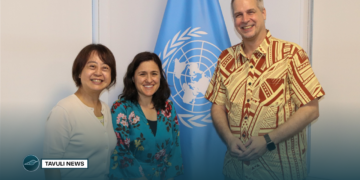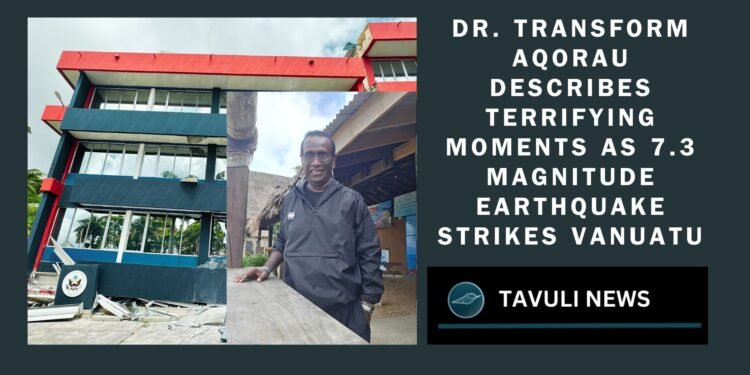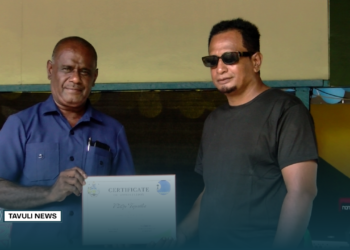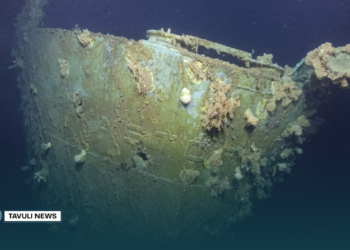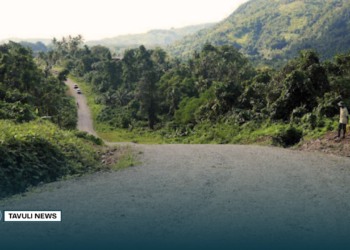Dr. Transform Aqorau Describes Terrifying Moments as 7.3 Magnitude Earthquake Strikes Vanuatu.
On the afternoon of December 17, 2024, a catastrophic 7.3 magnitude earthquake hit Vanuatu, leaving behind scenes of destruction, rising casualties, and ongoing rescue efforts. As of now, at least 14 people have been confirmed dead, over 200 injured, and more than 116,000 people are estimated to be affected by the quake’s devastating impact.
Among those caught in the chaos was Dr. Transform Aqorau, Vice Chancellor of the Solomon Islands National University, who was in Port Vila when the earthquake struck. He shared the terrifying details of the experience.
“We had just finished lunch, and suddenly the quake knocked us off our feet. People were scrambling, trying to run for safety,” Dr. Aqorau told Tavuli News. “If it had lasted another 10 seconds, the damage would have been even worse.” He recounted how aftershocks followed, making the situation even more unsettling. “We all ended up sleeping outside our rooms due to the aftershocks, which were also quite scary.”
Dr. Aqorau was fortunate to stay connected with loved ones using Starlink internet at a café, as Port Vila struggles with power and water shortages, compounded by damaged communication infrastructure. The city, currently without functional water or electricity services, is also facing difficulties with the internet and mobile networks.
The earthquake struck 30 kilometers west of Port Vila at a depth of 43 kilometers, causing widespread destruction, including landslides, collapsed buildings, and severe damage to key infrastructure. The US, New Zealand, and British embassies were among the many structures affected. Fortunately, the US Embassy later issued a statement confirming that all staff members are safe.
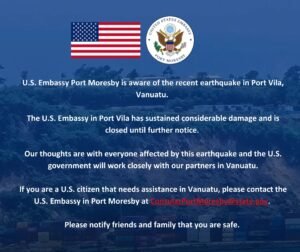
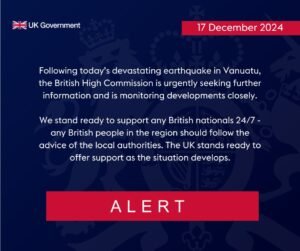
Drone footage has shown the extent of the damage—collapsed buildings, crushed vehicles, and extensive damage to roads, bridges, and the airport. The main hospital in Port Vila has set up triage tents outside as the building is not structurally sound, and its operating theater is non-functional.
Local journalist Dan McGarry shared on social media:
“Bottom line: It’s bad. People died, and many more were hurt. Some have lost their homes, and many will find it hard to get back to work. Repairs will likely stretch for years, as they always do in the wake of disaster.”
Michael Thompson, a long-time resident of Port Vila, described the quake’s intensity: “It was bigger than anything I’ve felt in 20 years. Some buildings have pancaked, and you can hear muffled screams inside.”
In response to the overwhelming damage, Vanuatu’s Caretaker Prime Minister Charlot Salwai declared a state of emergency and imposed a curfew in the hardest-hit areas. “It is a sad and devastating time,” said Salwai, offering condolences to the affected families and encouraging resilience in the face of the tragedy.
The international community has been quick to respond, with countries such as Australia and New Zealand deploying emergency teams to assist with rescue operations. The New Zealand Defence Force has begun aerial assessments and is helping with logistical operations on the ground.
Pacific Islands Forum Secretary General Baron Waqa expressed solidarity with Vanuatu, saying: “We mourn with families who have lost loved ones. The Forum stands ready to assist and offer support during this difficult time.”
The UN Office for the Coordination of Humanitarian Affairs (OCHA) said the most urgent needs include access to clean water, healthcare support and emergency communications.
Adding to the already volatile situation, Vanuatu is heading towards a snap election scheduled for January 14, 2025, following the dissolution of parliament by President Nikenike Vurobaravu. This earthquake strikes at a time of heightened political instability, with the country having faced multiple leadership changes in recent years.
Meanwhile, the Vanuatu national football team, currently in Honiara for the MSG Prime Minister’s Cup, has been caught in the aftermath of the disaster. The team, along with their fellow athletes from other Melanesian countries, shared fellowship as they awaited information from home. The players, who are concerned about the safety of their families and communities, have been offered support and camaraderie by their regional counterparts in this uncertain time.
The Anglican Church of Melanesia has urged its members across the region to “pray for the safety, comfort, and resilience of those affected.”
It remains unclear how many Solomon Islanders are currently in Port Vila.
As rescue operations continue, the people of Vanuatu brace for further aftershocks, while the international community looks to provide continued support and aid in the rebuilding efforts.













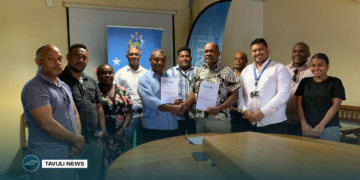










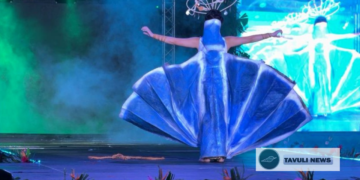






![Chovohio [left] and Charivunga [right] confluence, to create a dam for sediment control](https://www.tavulinews.com.sb/wp-content/uploads/2025/04/Add-a-heading-43-360x180.png)



























